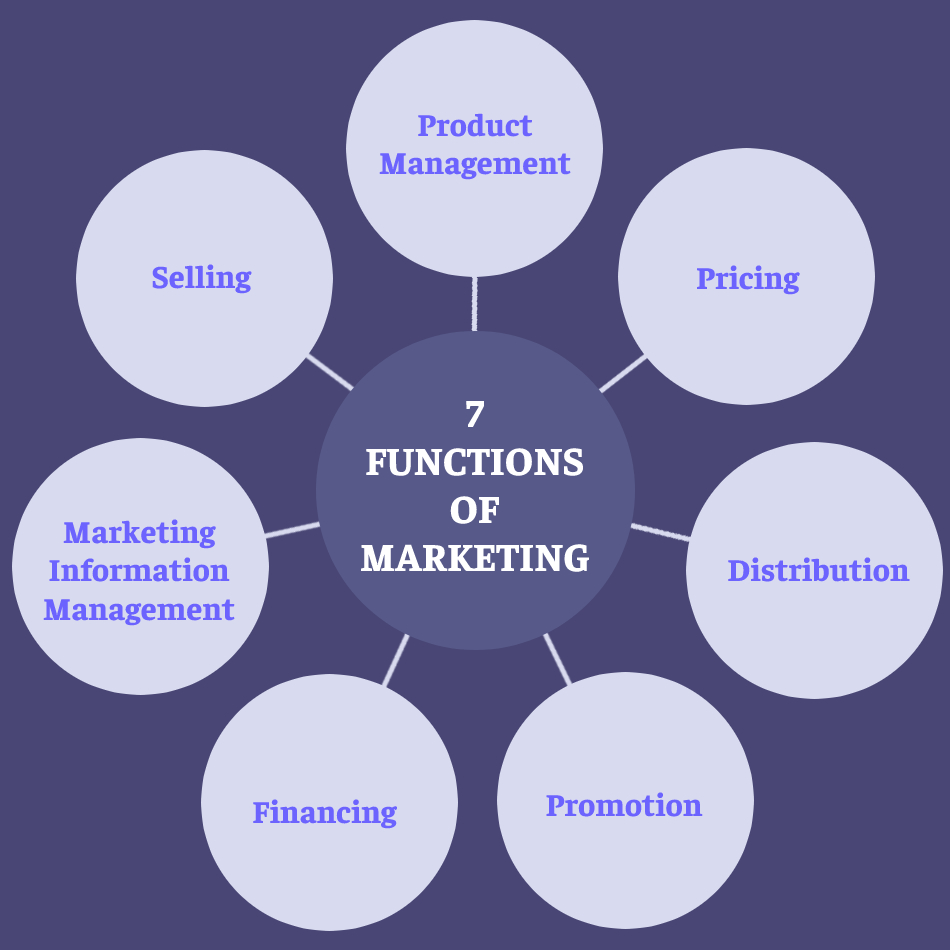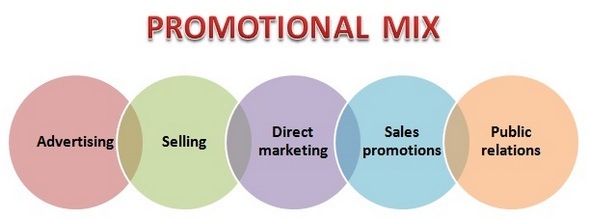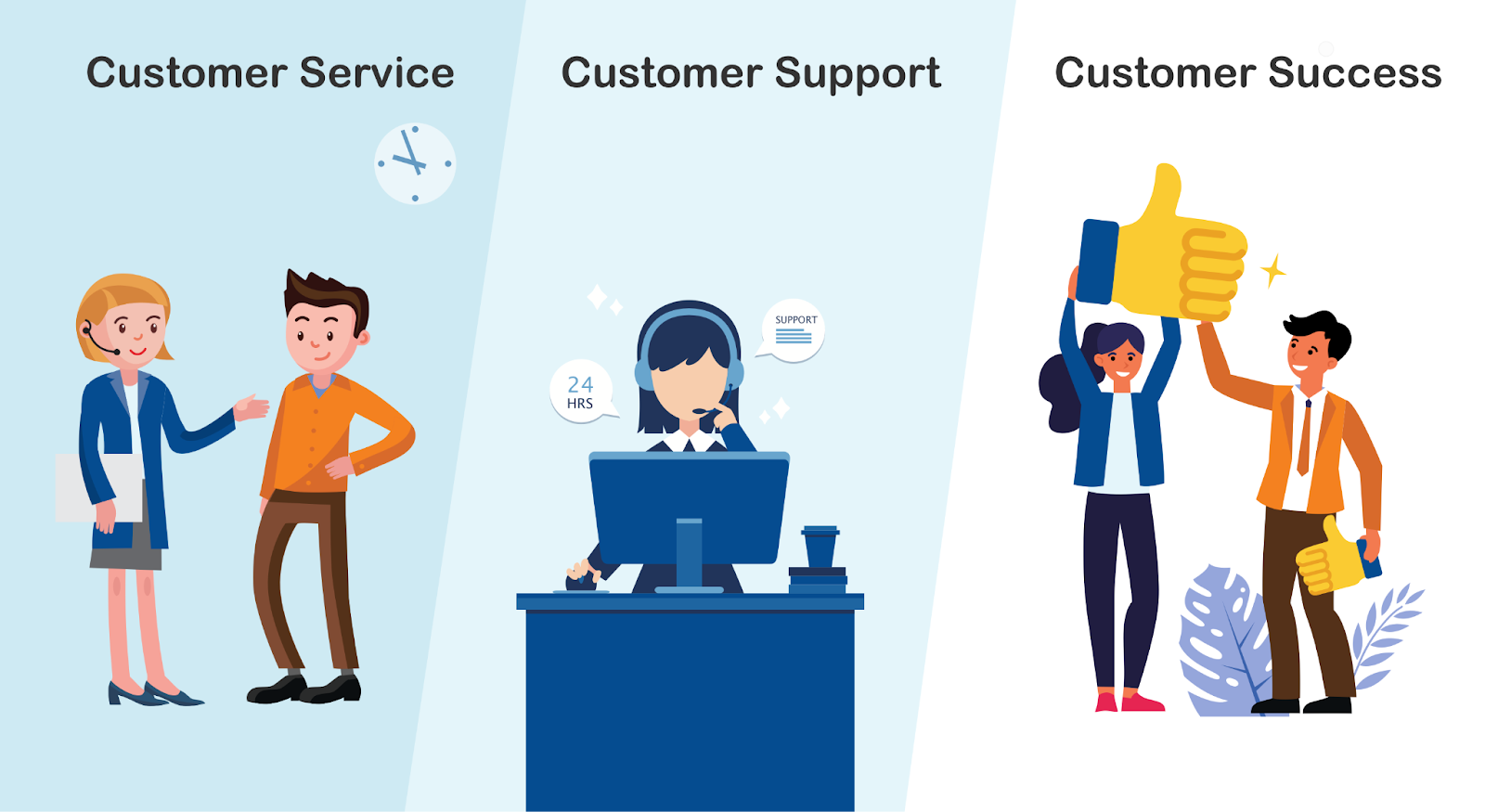Marketing is important for the expansion of business activities. It starts with researching for the market, that is finding out for whom the product is made and management of information. The above stages assist in marketing strategy which is a plan on how to access potential customers. Such strategy encompasses product life management and professional marketing methods.
Pricing strategy is a critical aspect to ensure that end users receive value while the company remains competitive in the industry. Distribution methods include self-service and other strategic options that fill the sales funnel effectively. Customer service is vital for customer retention and satisfaction.
Functions of marketing: an introduction
Functions of marketing are integral to an effective business growth plan. These include market research, management of goods and services, and organizational control. These functions help businesses understand customers, develop functional marketing plans, and execute effective promotional activities.

The adequate control of information in the performance of the above key points enables the marketer to find suitable outlets, create the right price brackets and even maximally fill the sale funnel. At the same time, customer care enhances the total customer satisfaction experience which is a marketing tool by its own merit.
This implies that one can add to business success and growth score by appreciating and executing marketing functions successfully.
1. Market research
Any business success is dependent on sufficient market research study. This also involves a combination of adequate knowledge on the market that one intends to reach, making an effective choice, then coming up with an appropriate marketing plan. These factors and many others enhance business growth.
Market research usually includes:
- Marketing research analysis
- Data management
- Sales funnel assessment
It enables proper product management, efficient customer support, and encompasses pricing and promotional activities. All these contribute to revenue optimization.
Moreover, it becomes critical for the actualization of the market research findings in actual distribution of the products and services in the market, thereby making it relevant to the corporate world.
Why market research is important
Every company must conduct at least one market research study to enhance strategic decision-making. It helps determine the target market details, the best distribution channels, and appropriate product pricing. Market research balances the shortcomings of internet-based market information and addresses concerns over cost and effort.
This research presents sufficient evidence for enhancement of product and services management, design of marketing strategies, and improved customer service management. Thus it plays a major role in the formation of a successful and strategic marketing plan, enhancing profitability, and managing the sales funnel for the purposes of achieving the business goals.
Methods to conduct market research
Marketing research drives business expansion by identifying areas where the company can gain advantages over competitors. It supports management information system requirements for marketing activities focused on creating value. Surveys are one effective method to gather data about the target audience’s preferences, tastes, and interests.
Observational methods involve watching customers navigate the sales funnel or evaluating competitors’ distribution systems. Experimental research tests new product strategies, pricing, or promotional approaches.
Such approaches provide a foundation for tactical development, growth of revenue, and product and services management effectiveness, thus promoting excellent customer service and competitiveness in the business environment.
Role of market research in marketing strategy
In shaping an organization marketing strategy, market research has to be done. It assists in comprehensive understanding of the target market by looking at what the consumers look out for while buying or using their products. In this regard, research is crucial for management particularly in the area of molding strategies, especially with regard to products, pricing, and promotions.
Thorough market research enables companies to select better distribution channels, enhancing sales funnel efficiency and revenue generation. It also improves customer service, facilitating business growth. Without market research, effective marketing and advancement in product and service management are not possible.
2. Product development
Market research, product management, and sound judgment are the main aspects of developing our product. Market research acts as a tool for assessing what the target market wants and influences the development and improvement of products that satisfy consumer needs. Product management ensures the product is handled from planning to marketing in an orderly and effective manner.
Strategic decision making links product development to improved business growth. This includes developing a price commensurate with the product's value and the company's income objectives. It also ensures effective distribution channels are established to reach customers quickly and efficiently.
All these factors must be present in our marketing system, enhancing effectiveness in the marketing system in promoting good customer service whilst enabling a functioning sales funnel.
Understanding the product life cycle
In any field that lays claim to product management and strategic directions, it is important to have a clear comprehension of the product life cycle. Such a cycle begins as soon as an idea becomes a product until it is put to rest and needs to be consistent in terms of market reviews as well as information management.

More specifically, the life cycle has four major phases: introduction, growth, maturity, and decline. These phases determine the marketing, pricing, and distribution channels to engage for business growth and revenue generation.
It is thus during the introduction stage, that online customer service and feedback is very much essential, while during the growth stage, marketing strategies and efficacious market selection is very important. In developmental marketing, throughout each stage, there is a constant move towards improving each stage, especially on how to build a sales funnel.
Contribution of product development to marketing
Marketing is attributed to product development, a key ingredient in strategy formulation and business development. It encompasses product management, pricing strategy, and selection of distribution avenues which are all determinants of revenue.
Through proper product development an achievable marketing strategy can be designed in that market research and information management will furnish the target market and therefore the product develops successfully which will help in increasing the sales funnel conversion rate.
Additionally, it has an effect on promotional plans and customer support systems, thus allowing organizations to have a manageable product and service delivery management that eventually improves competitiveness and growth potential in the market.
Marketing information management
Collecting relevant marketing data
Marketing information management begins with collecting relevant data that reflects customers, competitors, and market trends. This data includes:
- Customer demographics
- Purchasing behavior
- Website analytics
- Social media engagement
Using tools like Google Analytics, HubSpot, or Facebook Insights helps freelancers and small businesses gather accurate and up-to-date information efficiently.
For example, a freelance graphic designer can track which social media posts generate the most inquiries, while a small retail store might analyze sales data to identify peak shopping times. Collecting this data regularly ensures you have a clear picture of your market environment and customer preferences.
To get started, set up tracking tools tailored to your business goals and schedule weekly or monthly reviews of the data collected. This ongoing process creates a solid foundation for informed marketing decisions.
Organizing and storing marketing data effectively
Once you collect marketing data, organizing and storing it properly is essential for easy access and analysis. Using cloud-based Customer Relationship Management (CRM) systems like Zoho CRM or Salesforce Essentials allows freelancers and small businesses to centralize their information securely in 2024.
For instance, a freelance writer can keep track of client communication, project status, and payment history within a CRM, while a small business owner can segment customers by purchase history or location. Proper data organization reduces errors and saves time when creating targeted marketing campaigns.
Start by categorizing your data into logical groups such as customer profiles, sales figures, and campaign results. Regularly update your records and back them up to prevent data loss and maintain accuracy.
Analyzing marketing data to improve strategies
Analyzing marketing data helps you understand what works and what doesn’t, enabling smarter strategy adjustments. Tools like Microsoft Excel, Google Data Studio, or Tableau Public offer accessible ways to visualize and interpret your data in 2024.
A freelance photographer might analyze booking trends to identify the best months for promotions, while a small online store could examine conversion rates from different advertising platforms. Look for patterns, such as which customer segments respond best to certain offers or which channels drive the most traffic.
Make data analysis a routine part of your marketing process by setting clear metrics to track, such as customer acquisition cost or return on ad spend. Use insights gained to refine your messaging, optimize budgets, and improve overall marketing effectiveness.
3. Promotion
Effective growth parameters defining business development, and constituting the effective management of products and services, are captured in a proper marketing strategy. Market research and information management are crucial. These help identify the market and create promotional techniques that customers will respond to.
Strategic decisions include conducting effective marketing research, formulating appropriate pricing policies, selling efficiently to clients, and streamlining distribution networks to maximize sales. Following these processes is essential for building a formidable sales funnel.
Combining these interventions did not result in a well-functioning business system, causing stunted organizational growth. While advertising remains a vital part of promotion, it does not encompass the entire scope of promotion in the product ecosystem.

Types of promotional strategies
Promotional strategies are instrumental for improving firm effectiveness in service and product management. These strategies include conducting marketing research to understand your market audience and using that information for pricing decisions, sales funnel management, distribution, and customer service.
- The marketing strategy is one of the promotional strategies and it is all about planning which message and what type of media will communicate better with the target audience targeted.
- Another strategy is revenue generation, which in other words, is increasing sales by introducing special promotion offers or discounts to clients, as well as premium service.
- Thirdly, customer service oriented promotional strategies incorporate the formulation of relationships with existing, and even new customers by providing them with additional services.
The role of promotion in marketing
Promotion follows the marketing strategy. It is a marketing activity aimed at creating communication between enterprises and consumers. Promotional strategies include:
- Advertising
- Personal selling
- Sales promotions
- Public relations
- Direct marketing
These efforts support product management and customer service relations, clarifying the merits and characteristics of a good or service.
Proper promotion is essential for business growth. It drives sales and influences strategic directions by addressing the sales funnel and providing distribution avenues. Promotion is inspired by marketing and information management, actualizing the ideal mixture of factors for a marketing campaign.
4. Sales
Understanding how to manage the product is important for business development. By conducting market research and managing information, companies can focus on their available audience and design necessary marketing incentives. This benefits company success, customer service development, and revenue generation.
Sales funnel management requires strong strategic decisions. Components such as marketing strategy, pricing strategy, and technology choices for market distribution make all the difference. These strategies are supported by effective market research and are important for business expansion.
These strategies are designed not only for earning profit but also for successful management of products or services. The goals include earning profits and maintaining customer trust.
How to understand the sales process?
The sales process includes all steps needed for company development, based on marketing research targeting specific audiences, developing functional pricing policies, and effective product management. Tasks include:
- Creating distribution networks
- Carrying out marketing activities to attract audiences
- Providing customer support to generate revenue
Proper management of information is imperative for smooth operations and to prevent disruptions. A well-defined sales funnel captures customer attention from consideration through purchase. Understanding sales volume helps improve marketing techniques, product and service management, and ongoing marketing research to ensure continuity.
Role of sales in marketing
Sales are responsible for drafting and executing marketing strategy. This department plays a major role in formulating internal policies within the organization’s marketing strategies. Additionally, the sales team develops marketing techniques, pricing systems, and manages distribution channels to effectively target the market.
They help grow the business by generating sales and increasing profitability. Sales personnel manage the sales funnel and customer service, aiming to turn customers into loyal ones. Finally, sales are involved in information management by ensuring important marketing research data is used to manage and promote products and services effectively.
Marketing financing
Understanding the role of financing in marketing
Marketing financing is the process of securing and managing funds to support marketing activities. It ensures that your campaigns, promotions, and product launches have the necessary budget to reach your target audience effectively. Without proper financing, even the best marketing strategies can fall short due to lack of resources.
For freelancers and small business owners, understanding marketing financing means knowing how to allocate limited funds wisely. For example, if you have a $5,000 marketing budget for 2024, you need to decide how much goes toward digital ads, content creation, or email marketing tools like Mailchimp or Constant Contact. This allocation directly impacts the success of your marketing efforts.
To manage marketing financing effectively, start by forecasting your expected expenses and potential returns. Use simple spreadsheets or budgeting apps like QuickBooks or FreshBooks to track spending. This approach helps you avoid overspending and ensures funds are available for high-impact marketing initiatives.
How to secure funding for your marketing efforts
Securing funding for marketing can come from various sources:
- Personal savings
- Business loans
- Reinvesting profits
For freelancers, personal investment or a small business credit card can provide quick access to funds. Small business owners might consider a business line of credit or a marketing-specific loan from banks or online lenders like Kabbage or Fundbox.
Another practical option is crowdfunding platforms such as Kickstarter or Indiegogo for marketing campaigns involving new product or service launches. These platforms not only raise funds but also create early customer engagement. Additionally, some local governments offer grants or subsidies for small businesses investing in marketing. Checking state-specific programs can uncover valuable resources.
When seeking funding, prepare a clear marketing plan outlining how the money will be used and the expected return on investment (ROI). This clarity increases your chances of approval and helps keep your spending focused and accountable.
Managing marketing budgets for maximum impact
Effective budget management is crucial for maximizing the impact of your marketing financing. Start by prioritizing marketing channels that offer measurable results and align with your business goals. For instance, investing in Google Ads or Facebook Ads can deliver targeted traffic with clear performance metrics, allowing you to adjust spending in real time based on results.
Use marketing analytics tools like Google Analytics or HubSpot to monitor campaign performance and identify which activities generate the best ROI. For example, if your Instagram ads are converting better than email campaigns, consider reallocating funds accordingly. This data-driven approach prevents waste and improves overall marketing efficiency.
Lastly, set aside a contingency fund within your marketing budget, typically 10-15%, to cover unexpected opportunities or challenges. This flexibility ensures you can respond quickly to market changes without disrupting your entire marketing plan.
5. Pricing
It is important to make sure that the best pricing system or strategy is put in place in this regard so as to augment the revenue generation and expansion of the business. Such consideration takes into account the evaluation of the potential price range for the specific potential clients plus proper management of the product. It is part of the general compositing strategy of marketing that the price and demand are realized and integrated with the sales funnel as well as alter the moons of customer service.

The channels of distribution also influence the pricing policy by specifying the legal settlement price policies in case of the pricing geography. Information management becomes useful in providing feedback on these changes and helping to adjust the pricing responsiveness when there is a change in the market situation or when customers redesign their preferences.
Factors to influence pricing decisions
In any marketing strategy, pricing is integral to revenue generation and business development. Several factors affect pricing decisions, such as:
- Market demand
- Competition
- Cost of production
- Customer preferences
- The target market: How much the consumer is ready and willing to pay for a given product or a service.
- Product management: What it costs to manufacture the product, marketing, distributing & servicing the product.
- Competitor pricing: This involves market analysis to establish the price a competitor offered for a similar product or service.
Firms rely on efficient marketing research and information management as key drivers in the pricing strategies towards company policies. Pricing Policies and their significance in marketing
Role of pricing in marketing
Marketing incorporates the pricing elements that operate in market areas because it grossly determines the sales revenue of an organization. It is a critical aspect of the marketing plan of the company and is usually done after doing the market research. The results of such a study are important in developing a pricing plan for the specific market.
When policies on setting prices are well entrenched, they can positively affect the sales funnel, bring more customers to use products, and improve customer support which in turn boosts the revenues of the business.
The pricing strategies being studied should also assist in the effective control of the distribution activities of products and services. Therefore, it is clear that pricing is not merely assigning a price to a product, but rather it is fundamental to both promotional strategies and customer service aspects while also enhancing business growth.
Distribution in marketing
Other than making the sales in order to make sales, a well elaborated marketing strategy is very important for the growth of the business. Such an approach requires thorough studies on marketing for purposes of identifying target audiences and appropriate marketing activities. Familiarity with distribution structures is also important in product development and pricing processes.
Managing Information is essential in strategic management particularly in identifying appropriate sales funnel and revenue generation activities. Once more, excellent customer relationship management is one component of broader product and service management that can result in company growth.
These are the types of activities that enhance the proper understanding and application of those key factors that result in an efficient delivery of either products or services to the market.
Understanding distribution channels
Grasping the concept of distribution channels is crucial, in fact, the most crucial thing, whenever coming with a marketing plan. It means effective and elaborate marketing research to identify the effective channels of communicating the products/services to the market or target audience. All processes of making marketing decisions, alter the whole business from the products managed to the services provided.
Revenue generation and business expansion are directly linked to these channels. They are crucial in the sales funnel of a firm and influence pricing through the flow of information in the right direction. Certain market characteristics, such as client size and potential, the distribution range of the firm’s clients, market competition, and customer characteristics, may limit or enhance the distribution structures utilized.
In addition, distribution channels can enhance or constrain a company’s image and promotional measures through controlling product availability and customer experience. This means that identifying effective distribution channels is critical in achieving desired market performance and effective product and service management.
Role of rotation in marketing
Distribution is a crucial component in every marketing strategy. It refers to how the target needs are satisfied in terms of making the product or service accessible. This process of making strategic decisions is essential in the achievement of business expansion, income earning and management of products and services offered.
Effectiveness of the sales funnel and the level of customer service result from the distribution channels chosen and controlled. The combination of market analysis, marketing, and market information systems design gives companies the opportunity to gain a competitive edge. This helps develop the right customer and product strategies aimed at dominating market and profitability margins.
7. Customer service
With the ability to project a very strong customer service, a company can project a very strong marketing strategy which can result in great business advancement. Additionally, it can give meaningful data for market research and enable the marketing development in the entire product management chain.

Proper customer service is also a great help in determining the right prices for the products, improving the funnel for sales and diversification of the channels of distribution. The main objective is to increase the inflow of revenues and to help with the formulation of strategies.
In this way, the specific customers are better served which helps to better the management of the products and services. In addition to that, customer service post and pre-sales services include the tools for market analysis and strategic marketing communication planning.
Importance of customer service in marketing
Customer service is quite essential in the marketing mix since it affects optimization of the profit capacity of the business. It focuses on deciphering the market through marketing processes, providing solutions to the concerns on time and assuring them of their continued patronage which is key in both retention and acquisition of the customers.
Distinctive competency in customer service aligns with its primary aims of product management, effective pricing, and developing promotions or advertising campaigns. Good customer service also supports marketing management by generating user feedback on the product, which helps build sales channels and distribution networks. To achieve good marketing performance, a company needs strong customer service.
How important is customer service for customer retention?
Customer service is part of the strategies of the business and its importance in the process of growing the company and earning revenues cannot be under emphasized. It is an aspect of marketing strategy of an organization as it helps to achieve the level of satisfaction desired by the potential customers.
Effective customer service improves the sales funnel, ensures customer loyalty, and contributes to market research. As such, it follows that customer service can increase the productivity of a business, influence the policies regarding products and services, and determine the success of advertising campaigns.
How can Bonsai help manage your marketing projects successfully?
Managing marketing projects can be complex, but Bonsai is here to simplify the process and ensure your success. Bonsai centralizes all your project information, making it easy to access and manage.
Here’s how Bonsai can help you effectively manage your marketing projects:
1. Comprehensive project management
With Bonsai, you can break down your marketing projects into manageable tasks. Assign tasks to team members, set deadlines, and track progress effortlessly. The task management feature helps you stay organized and ensures that every aspect of your project is covered.
- Easily assign tasks to team members based on their skills and availability.
- Monitor the progress of each task and the overall project to ensure timely completion.
- Set and track key milestones to keep your project on schedule and ensure all critical deadlines are met.

2. Client management
Bonsai includes powerful client management features that help you maintain strong relationships with your clients. The client portal allows you to share documents, updates, and progress reports with clients, keeping them informed and engaged throughout the project. This promotes better communication and ensures that client expectations are met.
- Share documents and updates with clients in real-time.
- Receive and incorporate client feedback seamlessly.
- Maintain clear and consistent communication with clients to ensure satisfaction.

3. Financial Management
Managing your project budget is crucial for the success of any marketing campaign. Bonsai provides tools to track expenses, allocate budgets, and monitor financial performance. This ensures that you stay within budget and make informed financial decisions.
- Keep track of all project-related expenses to avoid overspending.
- Allocate budgets to different tasks and phases of the project.
- Generate detailed financial reports to monitor the financial health of your project.
By leveraging Bonsai’s range of features, you can streamline your workflow, enhance productivity, and ensure the success of your marketing projects. Bonsai’s centralized project information, comprehensive project management, client management, and financial management tools provide everything you need to manage your projects effectively.
Ready to take your marketing projects to the next level? Try Bonsai today and experience the difference!
Integrating all functions to make marketing more effective
Accurate marketing is crucial for business development and calls for the integration of various functions, including product and service management, information management, and pricing strategy. It is important to include market research and understand the target audience to develop an appropriate marketing plan that reaches a wider market.
More revenue can be obtained by using distribution channels and the proper sales funnel. Strategic decision making is essential for establishing promotional strategies and enhancing service quality. By integrating all these aspects, a business can utilize its full marketing potential and improve growth.







